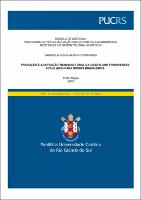| Share record |


|
Please use this identifier to cite or link to this item:
https://tede2.pucrs.br/tede2/handle/tede/8804| Document type: | Dissertação |
| Title: | Tradução e adaptação transcultural da heartland forgiveness scale (Hfs) para idosos brasileiros |
| Author: | Rodrigues, Gabriela Veiga Alano  |
| Advisor: | Argimon, Irani Iracema de Lima |
| Abstract (native): | A Heartland Forgiveness Scale (HFS) é um instrumento que mede a disposição pessoal para o perdão em relação aos outros, a si mesmo e a situações que se encontram além do controle de qualquer pessoa. Como um construto pertencente à Psicologia Positiva, o Perdão configura-se como um processo que envolve ferramentas cognitivas, emocionais, motivacionais e sociais, podendo também ser considerado uma forma de cuidado com o outro. O presente estudo teve como objetivo traduzir e adaptar transculturalmente a HFS, apresentar suas primeiras propriedades psicométricas, adaptando o instrumento para a população brasileira idosa. Para este estudo, o método de adaptação do instrumento foi divido em etapas: definições conceituais e revisão da literatura; tradução e síntese das traduções; retrotradução (backtraslation); análise de especialistas; estudo piloto e elaboração da versão final do instrumento; primeiras análises psicométricas da versão final do instrumento. Nas etapas de tradução, retrotradução e análises de especialistas participaram quatro tradutores e duas psicólogas especialistas. Já o estudo piloto contou com a participação de 32 idosos. Os instrumentos utilizados foram: Ficha de dados sócio demográficos, HFS, Mini-exame do Estado Mental, Escala de depressão geriátrica (versão reduzida, GDS-15) e a Escala de Afetos Positivos e Negativos (PANAS). A partir desse estudo, ainda que em caráter inicial, pode-se concluir que a HFS está traduzida para o português do Brasil e adaptada trasnculturalmente para a população idosa brasileira. Sendo assim, está apta a ser aplicada em uma população maior para que possa ser submetida a análises psicométricas de sua validação. A construção e adaptação de instrumentos de outras culturas se fazem necessárias para realidade brasileira devido a escassez de instrumentos nessa temática no país. Futuramente, pode também contribuir para a elaboração de técnicas de intervenção e criação de estratégias voltadas para prevenção e promoção da saúde do idoso. |
| Abstract (english): | The Heartland Forgiveness Scale (HFS) is an instrument which measures the personal disposition for forgiveness toward others, yourself, and situations beyond the control of anyone. As a construct belonging to Positive Psychology, Forgiveness is a process that involves cognitive, emotional, motivational and social tools, and can also be considered a way of caring for others. The present study aimed to translate and transculturally adapt the HFS, presenting its first psychometric properties, adapting the instrument to the elderly Brazilian population. In order to conduce this study, the adaptation method of the instrument was divided into stages: conceptual definitions and literature review; translation and synthesis of translations; backtranslation; expert analysis; pilot study and preparation of the final version of the instrument; inicial psychometric analysis of the instrument final version. Four translators and two specialist psychologists participated in the stages of translation, back-translation and analysis of specialists. The pilot study was attended by 32 elderly people. The instruments used were: Demographic Data Sheet, HFS, , Mini-exame do Estado Mental, Escala de depressão geriátrica (GDS-15) e a Escala de Afetos Positivos e Negativos (PANAS). From this study, although in an initial character, it can be concluded that the HFS is translated into Brazilian Portuguese and is transculturalally adapted to the Brazilian elderly population. Thus, the instrument is apt to be applied in a larger population so that it can be submitted to psychometric analysis of its validation. The construction and adaptation of instruments from other cultures are necessary for the Brazilian reality due to the scarcity of instruments in this subject in the country. In the future, it may also contribute to the elaboration of intervention techniques and the creation of strategies aimed at prevention and promotion of the health of the elderly. |
| Keywords: | Idosos Perdão Adaptação Transcultural |
| CNPQ Knowledge Areas: | CIENCIAS DA SAUDE::MEDICINA |
| Language: | por |
| Country: | Brasil |
| Publisher: | Pontifícia Universidade Católica do Rio Grande do Sul |
| Institution Acronym: | PUCRS |
| Department: | Escola de Medicina |
| Program: | Programa de Pós-Graduação em Gerontologia Biomédica |
| Access type: | Acesso Aberto |
| Fulltext access restriction: | Trabalho não apresenta restrição para publicação |
| URI: | http://tede2.pucrs.br/tede2/handle/tede/8804 |
| Issue Date: | 22-Feb-2019 |
| Appears in Collections: | Programa de Pós-Graduação em Gerontologia Biomédica |
Files in This Item:
| File | Description | Size | Format | |
|---|---|---|---|---|
| RODRIGUES_GABRIELA_VEIGA_ALANO_DIS.pdf | GABRIELA_VEIGA_ALANO_RODRIGUES_DIS | 3.6 MB | Adobe PDF |  Download/Open Preview |
Items in DSpace are protected by copyright, with all rights reserved, unless otherwise indicated.




